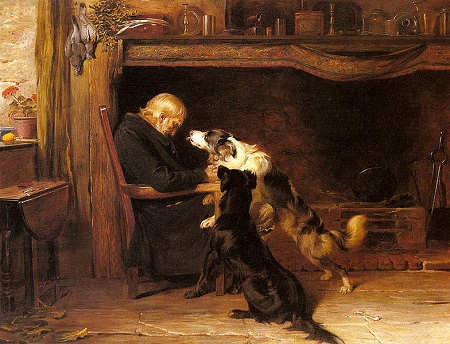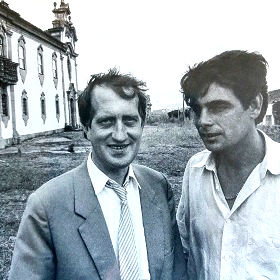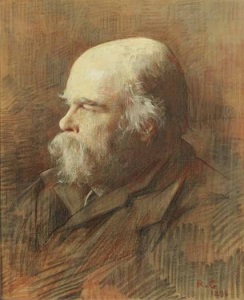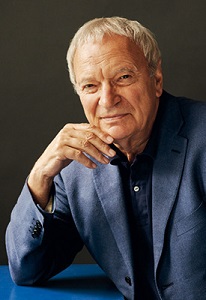Dolce far niente

The long sleep door Briton Rivière, 1868
The Old Man’s Comforts
and how he gained them
You are old, Father William the young man cried,
The few locks which are left you are grey;
You are hale, Father William, a hearty old man,
Now tell me the reason, I pray.
In the days of my youth, Father William replied,
I remember’d that youth would fly fast,
And abused not my health and my vigour at first,
That I never might need them at last.
You are old, Father William, the young man cried,
And pleasures with youth pass away;
And yet you lament not the days that are gone,
Now tell me the reason, I pray.
In the days of my youth, Father William replied,
I remember’d that youth could not last;
I thought of the future, whatever I did,
That I never might grieve for the past.
You are old, Father William, the young man cried,
And life must be hastening away;
You are cheerful, and love to converse upon death,
Now tell me the reason, I pray.
I am cheerful, young man, Father William replied,
Let the cause thy attention engage;
In the days of my youth I remember’d my God!
And He hath not forgotten my age

Robert Southey (12 augustus 1774 – 21 maart 1843)
De kathedraal van Bristol, de geboorteplaats van Robert Southey
De Nederlandse dichter, schrijver, criticus, polemist en toneelschrijver Gerrit Komrij werd geboren op 30 maart 1944 in Winterswijk. Zie ook alle tags voor Gerrit Komrij op dit blog.
Erasmus
Waar medemensen zwart zien zie ik wit.
Ik wens het tegendeel van wat zij wensen.
Verdomd als ik niet tot de duivel bid
Wanneer god weer in trek is bij de mensen.
Daar is toch echt niet veel bijzonders aan.
Dat is gewoon een snuifje rebellie
Dat geen oppassend heerschap zou misstaan.
Ik lach als ik mijn medemensen zie.
Maar wat als heel de wereld grijs zou zijn,
Geen zwart, geen wit? Dat is mijn grootste vrees.
Dan was ik lam en had ik niet eens pijn.
Dan zag ik medemensen die nooit kiezen.
Dan lost de kamer op in het gordijn.
Dan raakt de wereld leeg. Ik zou bevriezen.
Je kat
Vanmiddag gaf je je kat een kopje en likte haar
Staart schoon, toen ze plotseling naar je opkeek
Zoals je daar op je knieën zat, en merkbaar
Aangedaan zei ze: ‘Jongen, wat zie je bleek.’
Ze merkte niet meer hoe je naar haar terugkeek.
Ze kneep haar ogen toe en legde haar kop
Plat over haar voorpoten heen. Even streek
Je haar huid nog glad en hield toen verslagen op.
Tuberculeuze muziek dreef door het huis en
Je voelde je kleiner worden—onverwacht
Werden haar poten zo groot als leidingbuizen
En lag je verschrompeld tegen haar vacht.
Verliefd
Toen was er het heelal, met veel misbaar.
Een hete adem dreef, in schok na schok,
De wezenloze sintels uit elkaar.
Ad infinitum. Er was nog geen klok.
De kleinste aardverschuiving had de duur
Van anderhalve eeuw. Pas na een paar
Miljoen zonsondergangen stolde het vuur,
Tot er iets kwam als pool en evenaar.
Ze zeggen het. Voor mij is het niet waar.
Voor mij was alles, lucht en zee en land,
Met al wat ademt, in een oogwenk klaar.
In een minuut leek alles uitgebrand.
Maar toen ik, zo maar aan de overkant,
Jou langs zag gaan, verstreek er duizend jaar.

Gerrit Komrij (30 maart 1944 – 5 juli 2012)
Hier met zijn partner Charles Hofman (rechts) in Portugal in de jaren tachtig
De Franse dichter Paul Marie Verlaine werd geboren in Metz op 30 maart 1844. Zie ook alle tags voor Paul Verlaine op dit blog.
À Don Quichotte
Ô Don Quichotte, vieux paladin, grand Bohème,
En vain la foule absurde et vile rit de toi :
Ta mort fut un martyre et ta vie un poème,
Et les moulins à vent avaient tort, ô mon roi !
Va toujours, va toujours, protégé par ta foi,
Monté sur ton coursier fantastique que j’aime.
Glaneur sublime, va ! ― les oublis de la loi
Sont plus nombreux, plus grands qu’au temps jadis lui-même.
Hurrah ! nous te suivons, nous, les poètes saints
Aux cheveux de folie et de verveine ceints.
Conduis-nous à l’assaut des hautes fantaisies,
Et bientôt, en dépit de toute trahison,
Flottera l’étendard ailé des Poésies
Sur le crâne chenu de l’inepte raison!
Angélus de midi
Je suis dur comme un juif et têtu comme lui,
Littéral, ne faisant le bien qu’avec ennui,
Quand je le fais, et prêt à tout le mal possible ;
Mon esprit s’ouvre et s’offre, on dirait une cible ;
Je ne puis plus compter les chutes de mon cœur ;
La charité se fane aux doigts de la langueur ;
L’ennemi m’investit d’un fossé d’eau dormante ;
Un parti de mon être a peur et parlemente :
Il me faut à tout prix un secours prompt et fort.
Ce fort secours, c’est vous, maîtresse de la mort
Et reine de la vie, ô Vierge immaculée,
Qui tendez vers Jésus la Face constellée
Pour lui montrer le Sein de toutes les douleurs
Et tendez vers nos pas, vers nos ris, vers nos pleurs
Et vers nos vanités douloureuses les paumes
Lumineuses, les Mains répandeuses de baumes.
Marie, ayez pitié de moi qui ne vaux rien
Dans le chaste combat du Sage et du Chrétien ;
Priez pour mon courage et pour qu’il persévère,
Pour de la patience, en cette longue guerre,
À supporter le froid et le chaud des saisons ;
Écartez le fléau des mauvaises raisons ;
Rendez-moi simple et fort, inaccessible aux larmes,
Indomptable à la peur ; mettez-moi sous les armes,
Que j’écrase, puisqu’il le faut, et broie enfin
Tous les vains appétits, et la soif et la faim,
Et l’amour sensuel, cette chose cruelle,
Et la haine encor plus cruelle et sensuelle,
Faites-moi le soldat rapide de vos vœux,
Que pour vous obéir soit le rien que je peux,
Que ce que vous voulez soit tout ce que je puisse !
J’immolerai comme en un calme sacrifice
Sur votre autel honni jadis, baisé depuis,
Le mauvais que je fus, le lâche que je suis.
La sale vanité de l’or qu’on a, l’envie
D’en avoir mais pas pour le Pauvre, cette vie
Pour soi, quel soi ! l’affreux besoin de plaire aux gens,
L’affreux besoin de plaire aux gens trop indulgents,
Hommes prompts aux complots, femmes tôt adultères,
Tous préjugés, mourez sous mes mains militaires !
Mais pour qu’un bien beau fruit récompense ma paix,
Fleurisse dans tout moi la fleur des divins Mais,
Votre amour, Mère tendre, et votre culte tendre.
Ah ! vous aimer, n’aimer Dieu que par vous, ne tendre
À lui qu’en vous sans plus aucun détour subtil,
Et mourir avec vous tout près. Ainsi soit-il!

Paul Verlaine (30 maart 1844 – 8 januari 1896)
Portret door René Gilbert, 1894
De Duitse schrijver Uwe Timm werd geboren op 30 maart 1940 in Hamburg. Zie ook alle tags voor Uwe Timm op dit blog.
Uit: Heißer Sommer
„Ingeborg, die jetzt mit verweinten Augen auf dem Weg nach Hause war. Ich hätte sie nicht einfach so gehen lassen sollen, sagte Ullrich.
Lothar sortierte seine Karteikarten ein. Ich hab Schluß gemacht, sagte Ullrich. Ohne von seinen Karteikarten hochzublicken, sagte er nur: So. Und dann nach einer Weile: Besser jetzt als später. Einen Augenblick zweifelte Ullrich, ob Lothar ihn überhaupt verstanden hatte. Ob Lothar etwa glaubte, daß Ullrich mit seinem Referat Schluß gemacht habe. Daß er es nicht fertigschreiben würde. Er setzte sich auf Lothars Bett. Es quietschte genauso wie seins. Er hatte Ingeborg mit dem üblichen flüchtigen Kuß begrüßt. In den letzten Wochen hatte er schon öfter daran gedacht, es ihr zu sagen, flüchtig nur und undeutlich, aber heute hatte er nicht daran gedacht. Er wollte nur nicht mit ihr im Zimmer herumhocken oder ins Bett gehen. Er wollte raus. Als sie kam, hatte er gefunden, daß sie zuviel Parfum genommen hatte. Ein Parfum, das sie immer benutzte, und das er eigentlich mochte. Je reviens. Er hatte es plötzlich als aufdringlich empfunden. Er hatte ihr vorgeschlagen, spazierenzugehen, oder sich einen Film anzusehen. Sie war sofort einverstanden gewesen, wollte aber erst noch eine Zigarette rauchen. Sie setzte sich wie gewöhnlich aufs Bett und schlug die Beine übereinander. (So sitzen Fotomodelle auf den Zigarettenreklamen.) Unter dem hochgerutschten Kleid sah er die Innenseite ihres Oberschenkels. Er hatte sie nur ganz wenig gestreichelt, dann hatten sie sich wortlos ausgezogen. Komm, Lothar, sagte er, wir zischen ein Bier. Auf jeden Fall raus. Und meine Arbeit, fragte Lothar. Wie hältst du das nur aus, bei dieser Hitze, und dann dieses Professorengequatsche über Hölderlin. Mich kotzt das an, rief Ullrich.“

Uwe Timm (Hamburg, 30 maart 1940)
Zie voor nog meer schrijvers van de 30 maart ook mijn blog van 30 maart 2018 en mijn blog van 30 maart 2017 en eveneens mijn blog van 30 maart 2014 deel 2 en ook deel 3.
















